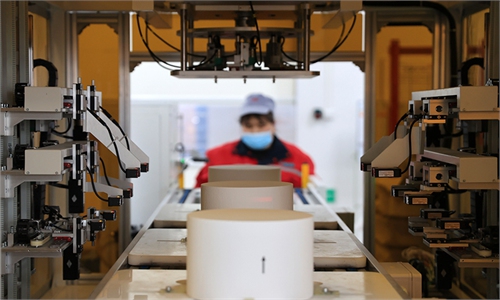Amid elevating AI hype, investors should be cautious to select true industry leaders

AI Photo:VCG
The global media hype about generative AI models, a top emerging tech, keeps heated, and Wall Street analysts are racing to tout the best artificial intelligence stocks amid a surge in broad investor interest. And during company earnings calls, corporate executives' mentions of generative artificial intelligence have significantly jumped in recent months.Meanwhile, scientists are calling for setting up "guardrails" to regulate and scrutinize the new emerging technology's exploration and development, as the technology may land in the hands of hooligans, who will create misinformation, hate speech, algorithmic manipulations and other wrong-doings.
AI technology evolution relies on various directions of computing algorithms, as the software programs aim to mimic the human ability to learn, interpret patterns and make largely accurate predictions. The newest forms of AI now generate content, including audio and video products.
The emerging AI technology innovations offer immense potential for enhancing digital customer experiences, making better business decisions and building sustainable competitive differentiation, which could be extended to AI simulation, causal AI, federated machine learning, graph data science, neuro-symbolic AI and reinforcement learning, according to AI engineers.
With regard to investment, in general, the investors are looking for AI stocks that use artificial intelligence innovations to improve products or gain a strategic edge on the market. Of course, the investors should keep their somberness and always be on guard against poorly performing companies that suddenly use and trumpet AI-enabled product roadmaps.
It's always good to be cautious amid the current media hype, for such embryonic technologies of AI present greater risks for deployment, but potentially greater benefits for early adopters to overhaul business operational models.
For example, Nvidia stock price rallying has regained pace lately as the artificial intelligence hype continues. The company's shares regained the resistance level at $440 as it jumped by more than 5% this week. This rally will likely continue after reports that Saudi Arabia and UAE were buying thousands of Nvidia-made GPUs for their AI investments. With a market capitalization of $1.01 trillion, Nvidia would be the 18th largest economy in the world. Yet, its revenue, growth, and profits do not match or justify this valuation.
Boosted by the market buzz over generative AI, the Nasdaq composite index has jumped more than 30 percent so far in 2023. But, obviously, some AI stocks may already enter into the bubble territory. One key question for investors is whether technology industry incumbents will be the big generative AI winners, or, will a new wave of AI start-up enterprises eventually dominate this evolving market.
The top artificial intelligence stocks to buy span across chipmakers, software companies, cloud computing service providers, and technology giants that utilize AI tools in many applications.
Generative artificial intelligence is projected to create new opportunities for innovation, and reach transformational benefit within the coming two to five years. AI stands high on more than 2,000 technologies and applied frameworks that industry advocacy leader Gartner profiles each year into a succinct set of "must-know" emerging technologies.
"The popularity of many new AI techniques will have a profound impact on business and society," said Arun Chandrasekaran, Distinguished VP Analyst at Gartner. "The massive pre-training and scale of AI foundation models, viral adoption of conversational agents and the proliferation of generative AI applications are heralding a new wave of workforce productivity and machine creativity."
However, some investors in early-stage artificial intelligence startups may be losing interest as the hype surrounding these companies begins to cool off. Those so-called AI seed companies have been attracting significant investment, but excessive valuations and high market expectations have led to a decline in investor enthusiasm. The decline can largely be attributed to the increasing number of artificial intelligence companies relying on pre-existing models like GPT, resulting in a lack of product differentiation.
The A.I. startup scene is currently facing rising investor fatigue, with greater scrutiny being placed on their technological differentiators and potential for long-term success. As the market becomes increasingly competitive, the start-up companies will need to provide solid answers on how they can maintain a competitive advantage and continue to attract funding for innovations.
The author is an editor with the Global Times. bizopinion@globaltimes.com.cn



